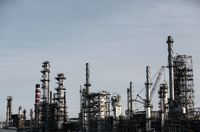Which cities in the UK are best for manufacturing jobs?

Despite a decline in the 1970s, the UK is currently the world’s ninth largest industrial nation. In the UK alone, manufacturing contributes £6.7 trillion to the global economy and employs approximately 2.7 million people, accounting for 10% of GVA. Data regarding employment and earnings shines a positive light on manufacturing where, according to the OECD, the UK has outperformed every country (except the US) for job creation since 2010 and since 2013 average earnings have risen by an impressive 3%.
Manufacturing is comprised of many industries from food and drink to biotechnology and demands analytical and creative skills. At present, the largest sector is food and drink at 17%, and the chemicals and pharmaceuticals and transport sectors account for 14% each. London and the South East are the biggest manufacturing regions, producing a yearly output of almost £28 billion. However, areas including the North West, West and East Midlands are all contributors, particularly in the Aerospace and Automotive sectors. It is estimated that by the year 2022, more than one million job vacancies will require manufacturing skills but which cities in the UK are currently thriving?
Burnley
The biggest manufacturing output in the UK comes from Burnley, the centre of the aerospace industry. In 2013, manufacturing provided for more than 22% of all employment. Some of the top companies in Burnley are AMS Neve, BCW, VEKA Plc and Futaba-Tenneco UK Ltd.
Aberdeen
Aberdeen has a high level of employment overall because of its abundance of skilled workers. In 2014, Aberdeen City contributed 12.4% to total GVA within the manufacturing sector which mainly included the beverages sector, food products and the manufacture of fabricated and metal products. In total, the turnover for the manufacturing sector in Scotland amounted to £35.6 billion.
Manchester
The manufacturing sector employs nearly one in ten residents of Greater Manchester, and this generates £3.9 billion of GVA every year. Key companies in this city include NXP, Siemens and Holroyd. For manufacturing jobs in Manchester, browse CV-library to find the best role for you.
Reading
Reading is ranked as the 5th best-qualified workforce in the UK, with almost 50% of the population educated to NVQ4 or above. Regarding manufacturing roles, it is home to 13 of the world’s top 30 brands including Microsoft, PepsiCo, Cisco, Symantec, Verizon, Oracle Corporation, Foster Wheeler, AMEC and Prudential who all have offices based in the city.
Leeds
According to the Confederation of British Industry (CBI), overseas demand for British-made goods is set to increase. Leeds is the UK’s largest production sector outside of London meaning it will benefit hugely from this demand. In 2016, Leeds saw the highest rate of growth in private sector jobs throughout the country, and it also has the highest ratio of public to private sector jobs.
Milton Keynes
This city benefits from the growth of the UK solar industry as well as manufacturing powerhouses such as Red Bull Racing and Marshall Amplification. It’s also the UK’s capital of fizzy drinks as it is the home to a Coca-Cola plant that produces 48 million cases a year and a 265,000 square foot manufacturing and distribution facility owned by AG Barr.
Derby
Derby is a huge centre for advanced transport industries including rail, automotive and aerospace. Manufacturing accounts for almost a fifth of all employment in Derbyshire and is home to leading businesses including Rolls-Royce, Bombardier and Toyota.
Sunderland
Sunderland is home to Nissan, the most productive car factory in the UK which supplies the industry on a worldwide scale. The ‘Economic Masterplan’ will help to set the direction for the city’s economy over the next 15 years and set out actions in the private, public and voluntary sectors to ensure that the city will have a sustainable future.
Telford
It may not be a city, but the town of Telford advertises itself as ‘The Birthplace of Industry’. The manufacturing sector here is diverse and employs more people than any other industry making up 16% of all jobs. Manufacturing here remains above the regional rate of 12.1% and the national rate of 8.1%.
Throughout the first three months of 2017, the manufacturing industry slowed markedly due to higher import costs after Brexit, but strong demand for goods at home and abroad meant that British factories have recently shown the fastest growth for three years. However, those compiling the PMI reports have cautioned against reading too much into this sudden growth as there are concerns regarding manufacturers facing shortages of materials, decreased consumer spending and weak sterling.




